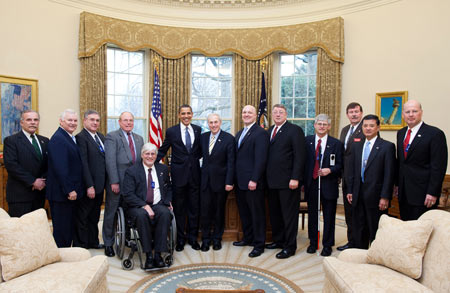
For the past few weeks, the anniversary of the birth of the modern gay rights movement has prompted renewed demands for the full integration of gays and lesbians into the military. Figures ranging from Gen. Shalikashvili to Barney Frank to a self-proclaimed conservative World War II spouse have all decried the obsolescence and inequity of "Don't Ask Don't Tell," urging the president and Congress to repeal the law. Amid this chorus of voices, however, one community has remained resolutely silent: national veterans service organizations.
While politicians are quick to pay lip service to the changing face of the Armed Forces, the organizations to which they turn for policy guidance can hardly be said to represent the full variety of experience embodied within today's military.
The vast majority of Veterans Service Organizations (VSOs), federally chartered advocacy groups with a strong lobbying presence on Capitol Hill, represent the interests of a dwindling number of World War II and Korean War veterans, whose ideologies continue nonetheless to shape institutional agendas. The result is a largely conservative lobbying force that belies the increasingly diverse political and cultural tendencies of current military personnel.
While the VSOs have long advocated for such laudable goals as improving the VA benefits system and expanding the GI Bill, their agendas too often fail to reflect the priorities of a younger and more progressive veteran population. As one advocate notes, these groups "have become overly conservative, driving many to believe their members feel the same way" despite indications to the contrary.
Others have been less diplomatic, dismissing the VSOs as anachronistic boys clubs willing to sacrifice any principle on the altar of flag-burning amendments. Vocal in their support of the Bush doctrine of unilateral and preemptive warfare, a number of these groups participated in pro-war rallies at the White House prior to the invasion of Iraq. One such organization, a staple at Congressional hearings, recently launched a campaign to address the "poverty, political instability, disease and war" bred by illegal immigration.
Outmoded or not, mainstream veterans groups have proven decidedly out of step with evolving views on a variety of civil rights issues pertaining to military personnel. While recent polls indicate that 75% of Americans favor allowing gays to serve openly in the military and 73% of active troops are personally comfortable with lesbians and gays, the VSOs have consistently opposed the repeal of "Don't Ask Don't Tell." Perhaps more notable is the silence of younger, more progressive groups like Iraq and Afghanistan Veterans of America; given their demonstrated ability to influence policy, their failure to promote this issue represents a particular loss.
Mainstream veterans groups remain similarly reticent on the challenges confronting women and minorities in the Armed Forces. Not a single such organization, for example, has addressed the growing epidemic of sexual assault and harassment in the military or the inaccessibility of emergency contraception and abortion options for servicewomen. A recent campaign to urge the military to accommodate the religious practices of Sikhs has likewise failed to attract the support of these groups. Whether their reluctance stems from a desire to avoid potentially divisive issues or an unintentional oversight on the part of their memberships, they ultimately fail to employ their considerable political muscle on behalf of those most in need.
While private organizations may well be expected to tailor their policy goals to the priorities of their members, they should not be in a position to monopolize public discourse. As of today, 15% of active military personnel are women and at least 65,000 are gay or lesbian, a reality very much at odds with the image represented by the all-white, all-male VSO cohort recently summoned to the White House by President Obama and VA Secretary Shinseki (see photo).

By excluding women and other vulnerable groups from policy discussions, lawmakers ultimately limit their own understanding of an increasingly complex and heterogeneous population. Women veterans, for example, are in a position to speak with particular authority on such issues as homelessness and "Don't Ask Don't Tell", both of which impact them in disproportionate numbers.
Their silence, meanwhile, hardly reflects a lack of interest. A recent Congressional hearing on women's health featured a remarkable assortment of speakers abounding with insight on unidentified and unmet needs. Ranging from a female combat amputee turned advocate for wounded warriors to the first South Asian woman officer in the U.S. Marine Corps to a 93 year-old veteran of the Women's Army Corps, the panelists embodied an extraordinary repository of wisdom and experience, both equal to and distinct from that of their male peers. Despite their credentials, however, these advocates are consistently absent from government hearings that do not pertain expressly to "women's issues."
It seems only fitting that the emblem of the original Women's Army Corps was the goddess Athena, who deftly combined the attributes of war with those of wisdom and peace. At a moment when women, gays, and other minorities are risking their lives for their country in unprecedented numbers, both fairness and common sense demand their full participation in shaping the policies that will affect them when they lay down their armor.